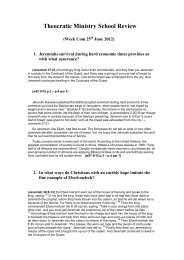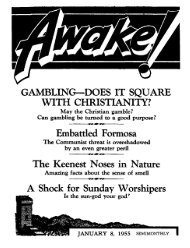1964 Awake! - Theocratic Collector.com
1964 Awake! - Theocratic Collector.com
1964 Awake! - Theocratic Collector.com
Create successful ePaper yourself
Turn your PDF publications into a flip-book with our unique Google optimized e-Paper software.
ers. The objective was to acquire jointly,<br />
and as cheaply as possible, such things as<br />
they needed in the way of food, clothing<br />
and household items. Despite this small<br />
beginning, the society prospered. So successful<br />
was it that it provided a basis for<br />
other cooperative societies that came later.<br />
Interesting are the principles agreed to<br />
by "The Rochdale Equitable Pioneers," as<br />
they were called. (1) Membership was to<br />
be open, with no restriction as to race,<br />
sex, religion, politics or other affiliation.<br />
(2) Democratic control was to exist, with<br />
one vote per member regardless of the<br />
amount of capital each invested. This<br />
would prevent the wealthy from dominating<br />
by having more capital invested.<br />
(3) Limited interest was returned on the<br />
capital they invested, so no huge profits<br />
would be taken out. (4) The savings made<br />
from the business were to be distributed<br />
periodically back to the members on the<br />
basis of their patronage. They would receive<br />
a refWld in precise proportion to<br />
their purchases at the society's store.<br />
(5) The cooperative would be neutral in<br />
politics, religion and other matters. (6) All<br />
transactions were to be made on a cash<br />
basis, with ample provision made for depreciation<br />
and reserves. The goods would<br />
he sold at current prices, which would<br />
have the effect of keeping other merchants<br />
from charging too much for their wares.<br />
Finally, (7) the cooperative would provide<br />
information and education continually on<br />
the principles and practices of cooperation.<br />
Generally speaking, the cooperatives in<br />
most countries have held to these principles,<br />
with variations due to local circumstances.<br />
However, in totalitarian land" this<br />
has not been the case, for there membership<br />
is often <strong>com</strong>pulsory and has much to<br />
do with politics.<br />
After Rochdale, cooperative societies<br />
soon sprang up in many countries. However,<br />
in some it was a difficult proposition.<br />
18<br />
In Sweden, for example, laborers were le.gally<br />
forbidden to form organizations of<br />
any sort, but in time the government had<br />
to retract such laws. A Swedish writer,<br />
Axel Gjores, a former cabinet minister,<br />
said that cooperation "sprang from the<br />
people themselves, was born out of the<br />
pressing needs of the lower strata to better<br />
their everyday conditions and fostered by<br />
the growing understanding of the necessity<br />
of organized cooperation and the demands<br />
of such cooperation."<br />
After tough resistance, cooperative societies<br />
got going in Scandinavia in the<br />
1860's. One of the first was a consumers'<br />
association at Stavanger, Norway. It came<br />
to be called the "Bag Association" because<br />
its members had to bring their own bags<br />
when they picked up the goods they ordered,<br />
which goods were distributed on<br />
certain days. In Sweden the small associations<br />
were <strong>com</strong>bined into a joint cooperative<br />
society in 1899. Since that time it has<br />
grown to be one of the country's largest<br />
employers, with more than 20,000 employees.<br />
Over one-third of Sweden's population<br />
now buys their goods through the cooperative<br />
association, popularly called "Konsum,"<br />
and the cooperative is responsible<br />
for 14 percent of the general retail and 26<br />
percent of the foodstuff trade. In Sweden<br />
the cooperative movement has even taken<br />
over manufacturing plants to produce<br />
some of its goods, thus uniting the consumer<br />
and producer cooperative ideas. Additionally,<br />
the cooperative runs many restaurants,<br />
correspondence schools, insurance<br />
businesses and even motion picture production!<br />
Little did the Rochdale group<br />
realize how their small beginning would<br />
develop into the huge business establishment<br />
now seen in Sweden!<br />
In Denmark opposition was also strong,<br />
but in 1852 the first really cooperative<br />
association was formed, the "Fuel Association"<br />
in Copenhagen. It had as its ob-<br />
A W A K.li1-/.,




